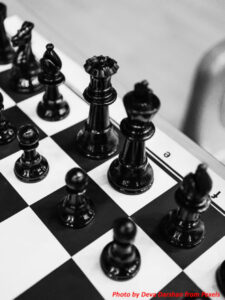 I don’t recall how Josh Waitzkin’s book The Art of Learning: An Inner Journey to Optimal Performance wound up on my reading list. I didn’t recognize his name from the days when he was America’s chess phenom on whom the movie Searching for Bobby Fisher was based. I didn’t know that he’d gone on to win 21 national martial arts championships and several world titles. And, truth be told, I’m not at a stage in my life where I’m seeking peak performance in a competitive arena. However, the book provides an interesting window into the worlds of competitive chess and Push Hands tai chi while sharing good advice for high achievement in any discipline. Bottom line: A good read.
I don’t recall how Josh Waitzkin’s book The Art of Learning: An Inner Journey to Optimal Performance wound up on my reading list. I didn’t recognize his name from the days when he was America’s chess phenom on whom the movie Searching for Bobby Fisher was based. I didn’t know that he’d gone on to win 21 national martial arts championships and several world titles. And, truth be told, I’m not at a stage in my life where I’m seeking peak performance in a competitive arena. However, the book provides an interesting window into the worlds of competitive chess and Push Hands tai chi while sharing good advice for high achievement in any discipline. Bottom line: A good read.
Here are my take-aways:
Mastery relies upon a solid foundation in the fundamentals and keen insights into the dynamics of play. Those who get to the top have a well-conceived approach that inspires resilience, the ability to make connections between diverse pursuits, and a genuine enjoyment of daily practice. They have a passion for learning and the heart for continuous improvement.
In accordance with Dr. Carol Dweck’s research, a growth mindset yields substantive benefits over a fixed mindset. The latter views intelligence and competencies as innate endowments that are set at birth. It places limits on one’s potential and may lead to overly conservative behavior. A growth mindset views intelligence and competencies as qualities to be developed with passion, toil, and training. It believes in possibilities, instills an appreciation for the value of learning, and encourages relationship with those who have far better skills and knowledge. “We learn by pushing ourselves and finding out what lies at the outer reaches of our abilities.” Painful losses can provide a jumping off point for the next leap forward.
We should expect setbacks, distractions, and disappointments. Progress comes in ebbs and flows. Our environments won’t always be conducive to undisturbed thinking. We’ll make mistakes or get bad breaks that adversely impact outcomes. We can bolster our performance by working in less than ideal conditions (e.g., noise, interruptions) and getting acclimated to them. It helps us learn to flow with whatever comes and use it to our advantage. And when results fall short of expectations, we learn the lesson(s) and move on.
Errors and mental lapses happen. We must regain composure quickly and be present to what is going in the moment. When carrying unrealistic expectations of perfection or getting frozen in the past, we open ourselves up to making more mistakes and moving in a downward spiral.
In any long-standing discipline, it often pays to reinstate “beginner’s mind.” We go back to the basics and take things apart for the sake of identifying and correcting bad habits and creating a platform for long-term improvement. Waitzkin refers to it as a “plunge into the detailed mystery of the micro in order to understand what makes the macro tick.” It may be challenging when internal and external expectations run high for performance. But it’s often what’s needed to break through.
While a certain intensity may be necessary for peak performance, it is not forwarding to sustain that attitude feverishly. Much like interval training, mind and body profit from stress and recovery. Concentration improves when paired with little breathers.
When called upon to perform, it’s really helpful to have a routine that reliably evokes “the zone.” Time permitting, it might contain a light snack, meditation, stretching, and listening to music. A shortened version may suffice when the clock’s ticking. Why does it matter? There are physiological and mental connections that come into play between a performance and the activity that immediately precedes it. And these connections can be invoked by simply visualizing the routine!
Finally, there is much to be said for developing one’s own distinctive expression of a discipline. Successful competitors play the game differently. Successful artists leverage their natural gifts, creative sensibilities, and life experiences to good effect. Great thinkers tackle problems differently. The right combination of passion, individuation, and dedicated effort can produce wonders.